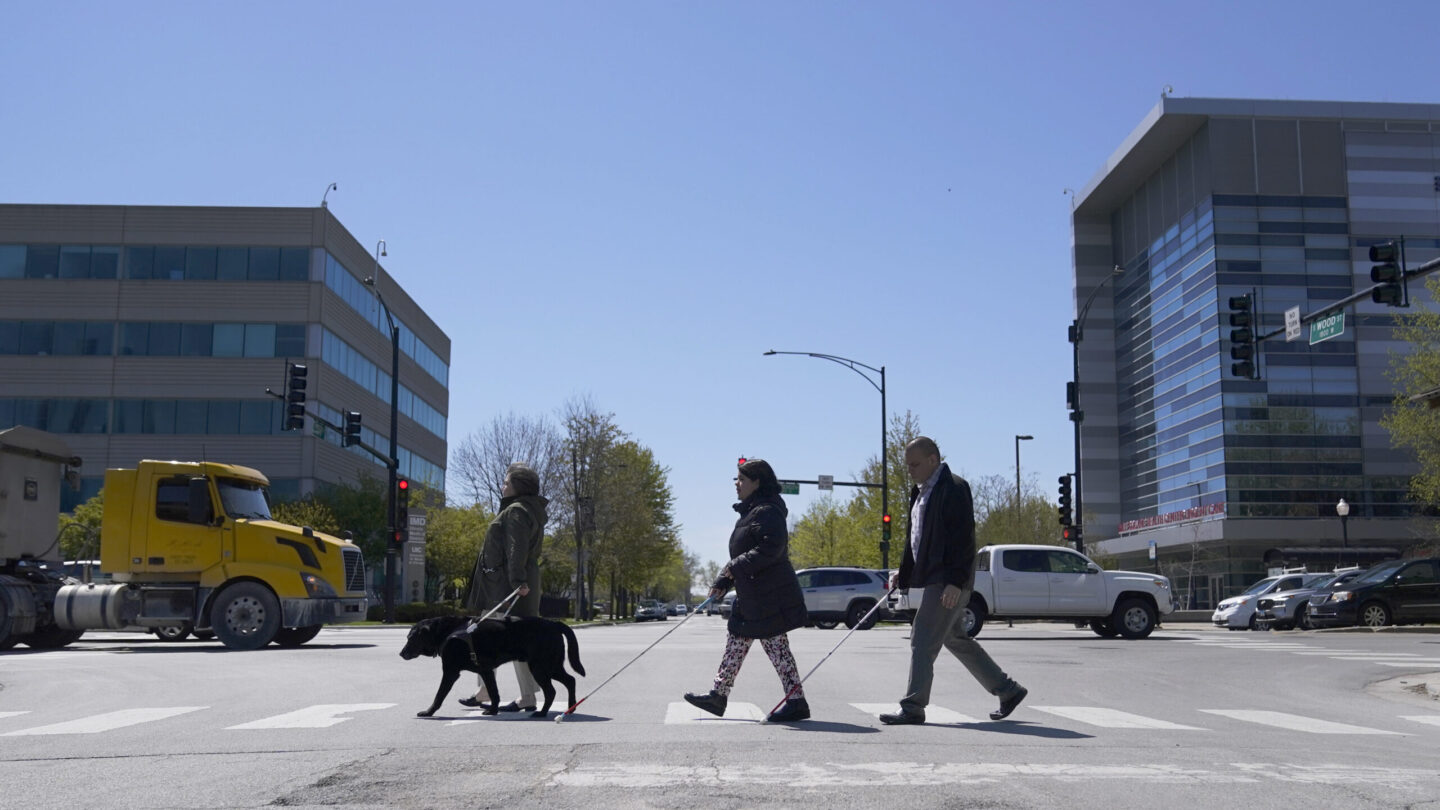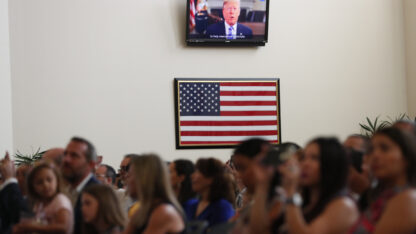A controversial Census Bureau proposal could shrink the US disability rate by 40%

A proposal to change how the Census Bureau produces a key set of estimates about the number of people with disabilities in the United States has sparked controversy among many disability advocates.
Some are concerned that the potential revisions to the disability questions on the bureau’s annual American Community Survey, as well as how the bureau reports out people’s responses, could skew the government’s official statistics. That in turn, advocates worry, would make it harder to ensure that disabled people have access to housing and health care, enforce legal protections against discrimination in schools and at work, and prepare communities for disasters and emergencies.
The proposal has also resurfaced longstanding questions about how accurately the bureau’s data represents people with disabilities in the U.S., especially as more people are living with the emerging effects of long COVID.
The bureau says the recommended changes are part of a years-long effort to improve the quality of its disability data and standardize the statistics so they’re comparable to other countries’ numbers.
But the agency is getting pushback for its proposed shift from asking yes-or-no questions — about, for example, whether a person has “serious difficulty” with hearing, seeing, concentrating, walking and other functional abilities — to asking a person to rate their level of difficulty.
New estimates of disabled people, a committee of federal agency representatives has recommended, would be based on only survey participants who report “A lot of difficulty” or “Cannot do at all.” Those reporting “Some difficulty” would be left out.
Why the proposal is controversial
Many supporters of the proposed changes emphasize the value of the detailed data that could be produced by moving away from yes-or-no questions.
“Forcing a dichotomy masks a great deal of nuance, information that can be used by a variety of stakeholders to examine outcomes for people experiencing different levels of functioning,” Julie Weeks, a National Center for Health Statistics official whose research focuses on disability, said at a public meeting of one of the bureau’s committees of outside advisers in November.
This approach, measuring disability based on levels of difficulty with activities, was developed by the Washington Group on Disability Statistics, a group of international experts put together by the United Nations Statistical Commission.
“I think it can help advocacy by showing how the more functional difficulties you have, the more barriers you face, the worse your outcomes are. And I think that can help us design policies,” says Daniel Mont, the CEO and co-founder of the Center for Inclusive Policy, who served as chair of the Washington Group’s analytical working group.
Following international standards, Mont adds, would allow the U.S. to “benchmark yourself against other countries” and better understand “if you’re doing a good job at reaching people with disabilities.”
Still, Mont recognizes the limitations of the proposed changes. While they include a new question about communication difficulties, the revised questions do not fully address the experiences of people with, for example, psychiatric disabilities or chronic health conditions.
Mont, however, points to a way these proposed question changes could result in an increase rather than a decrease in the rate of disability. Including survey participants who report “Some difficulty” alongside those who report “A lot of difficulty” or “Cannot do at all” could more than double the U.S. disability rate, according to the bureau’s research.
But the bureau’s current proposal is to use as its “primary” measure a more selective definition of disability, which would count only “A lot of difficulty” or “Cannot do at all.” The bureau’s researchers, who are planning in 2024 to explore the possibility of releasing data based on the broader definition, say in their report that their focus is in line with viewing disability “as arising only if an individual’s impairment leads them to encounter barriers to participating in society.”
Members of the bureau’s National Advisory Committee, however, including Marlene Sallo, the executive director of the National Disability Rights Network, have urged the bureau not to adopt these proposed changes.
“I am a woman with a disability, and my disability is several. But one that comes to mind immediately is my degenerative spinal condition. And so, on some days, I have some difficulty, but overall, I function on a daily basis,” Sallo said at the committee’s meeting last month, before questioning whether she would be counted in the bureau’s proposed definition of disability.
“It is not inclusive, and it will miss many individuals within my community,” Sallo warned.
And that could have a direct impact on people’s daily lives, says Marissa Ditkowsky, an attorney focused on disability economic justice at the National Partnership for Women & Families.
Ditkowsky, who is multiply disabled, says she relies on the American Community Survey’s disability data to advocate for health care resources for disabled people.
“Disabled folks are already undercounted. But to further undercount them is just absolutely harmful to our policies, the way we allocate funding and civil rights enforcement,” Ditkowsky adds.
Why some advocates are calling for a national task force on disability data
For Bonnielin Swenor, the director of the Johns Hopkins University’s Disability Health Research Center, who has a visual disability, the bureau’s proposed question changes are out of date with how many disabled people view their disabilities.
“Disability is now viewed as a social construct, as a group of people. And the questions don’t meet or match that framing of disability,” says Swenor, who led a group of researchers who specialize in disability data in writing a letter to the bureau’s director in October.
Swenor is calling for the bureau to put aside its current proposal and instead help form a national task force on improving how the federal government produces disability data. It would be an opportunity, Swenor says, to center the perspectives of disabled people in the U.S., which critics of the bureau’s proposals say were missing in many of the discussions leading up to this point.
The main committee for coming up with these proposals did not add representatives from the Administration for Community Living — an agency that includes the federal government’s main disability research organization, the National Institute on Disability, Independent Living and Rehabilitation Research — and the Centers for Medicare and Medicaid Services until this year, the bureau confirmed to NPR in an email statement.
Mont, the former chair of the Washington Group’s analytical working group, adds there was not a lot of involvement of U.S. organizations for people with disabilities in developing the proposed questions.
“Have people with disabilities been excluded from the process? Absolutely not,” Mont says. “Have people with disabilities from the U.S. advocacy community not been involved until the last minute here? In that case, I think that’s probably a fair thing to say.”
If the bureau does not move forward with its current proposals for the 2025 version of the American Community Survey, the bureau says there’s still a chance to make these changes in time for 2026. Any new proposals, however, would have to go through testing, which is not scheduled to start again for the survey until 2027.
That additional time could be needed to work through the complications of coming up with an alternative approach, says Lydia X. Z. Brown, the director of public policy at the National Disability Institute, who is multiply disabled.
“The issue with focusing solely on functioning is that many people will count themselves out for a variety of reasons, including internalized ableism,” Brown says. “And on the other hand, asking solely, ‘Do you have a disability or not have a disability’ would also lead to many people counting themselves out because they don’t necessarily know that the word ‘disability’ can be a wide-ranging category.”
The fundamental question, according to Swenor of the Johns Hopkins Disability Health Research Center, is, who gets the power to decide who is disabled or not?
“I think that requires some deep thought and conversations around inequity and inequities that have been entrenched in this process,” Swenor says.
Edited by Benjamin Swasey
9(MDAxODM0MDY4MDEyMTY4NDA3MzI3YjkzMw004))








